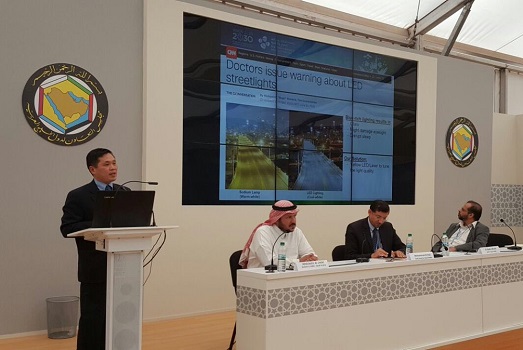Multidisciplinary KAUST team attends COP22

Boon Ooi, professor of electrical engineering from the KAUST Computer, Electrical and Mathematical Science and Engineering division, addresses COP22 conference attendees.
A multidisciplinary delegation from KAUST attended the 22nd Session of the Conference of Parties to the United Nations Framework Convention on Climate Change (COP22), which was held in Marrakech, Morocco, from November 7 to 18, 2016. The KAUST team who traveled to Morocco included faculty, staff and researchers.
COP22 focused on actionable items in order to achieve the priorities of COP21 and the Paris Agreement, and especially those related to adaptation, transparency, technology transfer, mitigation, capacity building and loss and damages.
KAUST researchers Boon Ooi, professor of electrical engineering, Youssef Belmabkhout, senior research scientist in the University's Advanced Membranes & Porous Materials Center, and Ibrahim Hoteit, associate professor of Earth science and engineering, all presented at the event.
In his address, Hoteit discussed how KAUST researchers study the climatic shifts of the Red Sea.
“We study and forecast the circulation and climate of the Red Sea with an integrated data-driven modeling system,” he said.
KAUST Solar Center Director Iain McCulloch also gave a lecture on solar energy, spinouts and technology and how KAUST is trying to address some of the specific challenges for solar energy within the Gulf region.
“Our mission is dedicated to advancing science and technology through interdisciplinary research, education and innovation—the point there is that we’re not just a university. We are interested in some of the opportunities in terms of spinout technology creation for Saudi Arabia and the region,” McCulloch said.
“At KAUST, we are developing new technology to generate white light out of semiconductor lasers, which can save up to 50 percent of the electricity used for lighting. In addition to these savings, our work opens the door for substantially improving energy efficiency in applications such as indoor horticulture and moves us further toward the ultimate goal of producing limitless clean fuel (hydrogen) out of solar energy,” he said.
At COP22, UN member states made great efforts to reach agreements on reducing greenhouse gas emissions caused by human activity. Delegates also discussed and assessed the evolution of shared commitments and reviewed the implementation of the Framework Convention and other legal instruments that the COP adopts.
Salaheddine Mezouar, president of COP22, saw the event as an “opportunity to make the voices of the most vulnerable countries to climate change heard, in particular African countries and island states. It is urgent to act on these issues linked to stability and security,” he said.
- By David Murphy, KAUST News
A multidisciplinary delegation from KAUST attended the 22nd Session of the Conference of Parties to the United Nations Framework Convention on Climate Change (COP22), which was held in Marrakech, Morocco, from November 7 to 18, 2016. The KAUST team who traveled to Morocco included faculty, staff and researchers.
COP22 focused on actionable items in order to achieve the priorities of COP21 and the Paris Agreement, and especially those related to adaptation, transparency, technology transfer, mitigation, capacity building and loss and damages.
KAUST researchers Boon Ooi, professor of electrical engineering, Youssef Belmabkhout, senior research scientist in the University's Advanced Membranes & Porous Materials Center, and Ibrahim Hoteit, associate professor of Earth science and engineering, all presented at the event.
In his address, Hoteit discussed how KAUST researchers study the climatic shifts of the Red Sea.
“We study and forecast the circulation and climate of the Red Sea with an integrated data-driven modeling system,” he said.
KAUST Solar Center Director Iain McCulloch also gave a lecture on solar energy, spinouts and technology and how KAUST is trying to address some of the specific challenges for solar energy within the Gulf region.
“Our mission is dedicated to advancing science and technology through interdisciplinary research, education and innovation—the point there is that we’re not just a university. We are interested in some of the opportunities in terms of spinout technology creation for Saudi Arabia and the region,” McCulloch said.
New energy efficient technology
Ooi spoke about next generation energy efficient lighting, which uses white light generated by semiconductor lasers in his keynote address.“At KAUST, we are developing new technology to generate white light out of semiconductor lasers, which can save up to 50 percent of the electricity used for lighting. In addition to these savings, our work opens the door for substantially improving energy efficiency in applications such as indoor horticulture and moves us further toward the ultimate goal of producing limitless clean fuel (hydrogen) out of solar energy,” he said.
Sharing the University’s vision with the world
During the event, Associate Director of the KAUST Advanced Membranes & Porous Materials Research Center Mohamed Eddaoudi noted, “Our contribution today is to share with the world our vision and our research.”At COP22, UN member states made great efforts to reach agreements on reducing greenhouse gas emissions caused by human activity. Delegates also discussed and assessed the evolution of shared commitments and reviewed the implementation of the Framework Convention and other legal instruments that the COP adopts.
Salaheddine Mezouar, president of COP22, saw the event as an “opportunity to make the voices of the most vulnerable countries to climate change heard, in particular African countries and island states. It is urgent to act on these issues linked to stability and security,” he said.
- By David Murphy, KAUST News
Related stories
- Step into the white light for faster communication
- Nano-Lego for clean energy
- Reconstructing the Red Sea's climate patterns
- Building blocks for methane gas storage
- Solid progress in carbon capture

